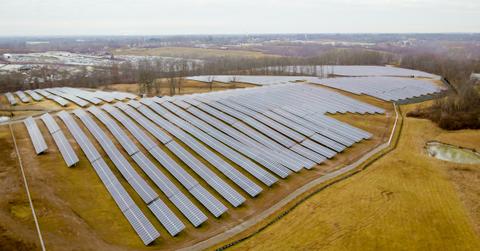Investing in Utility Companies—Some Are Public, Others Are Private
Many utility companies are publicly traded, while others are privately or community owned. How can you invest in utility companies?
Feb. 19 2021, Updated 2:13 p.m. ET
Most of us certainly think of electricity when we consider various utilities we pay to use in our homes and businesses. However, utilities cover a much wider range of services than just electricity. The utility sector includes basic services like clean water, sewage, and natural gas.
Utility companies might be publicly traded (investor-owned) or privately owned. Electric rural cooperatives are common in some areas of the U.S. where the owners are also the consumers. According to Power Magazine, over 2,000 cities and towns in the U.S. receive their electricity from nonprofit, community-owned utilities.

Who owns utility companies?
Some utility companies are publicly-traded entities listed on a traditional stock exchange. Other electric utilities are rural cooperatives, which are set up as tax-exempt nonprofit businesses. They provide electrical services to the consumers who own them.
Some publicly-traded utility companies available to investors
Duke Energy (NYSE:DUK) is an electric power holding company with services in six U.S. states. Duke Energy has about 7.7 million customers. Its natural gas distribution is found in Ohio, Kentucky, Tennessee, and the Carolinas. The company's electricity serves the Carolinas, the Midwest, and Florida. Recently, Duke Energy declined a takeover attempt by NextEra.

Duke Energy Lincoln Project
NextEra Energy (NYSE:NEE) is the largest electric provider in Florida. It’s also one of the largest clean energy companies.
Dominion Energy (NYSE:D) is headquartered in Richmond, VA and operates in 16 states. Dominion Energy brings clean and affordable energy to 7 million customers.
Exelon provides electric and gas services to customers including companies like ComEd, BGE, Delmarva Power, and Atlantic City Electric. Exelon also runs a large fleet of nuclear power plants.
Spark Energy Inc. (NASDAQ:SPKE) has headquarters in Houston and is an independent retail energy services company.
Water utility companies
Several water utility companies are publicly traded.
American Water Works (NYSE:AWK) is one of the largest water utility stocks. New Jersey and Pennsylvania are two of its largest markets. It also has regulated operations in 14 other states. American Water Works' dividend has gone up every year since it went public in 2008.
Global Water Resources trades on the Nasdaq under the symbol "GWRS" and works with regulated water, wastewater, and recycled water, mainly in Phoenix. It pays a monthly dividend, which has increased yearly since 2016, according to Nasdaq.
Middlesex Water (NASDAQ:MSEX) is another East-coast water utility company, with regulated water and wastewater utility operations in New Jersey, Delaware, and Pennsylvania. It has raised its dividend for 48 consecutive years.

How to invest in utility companies
Many investors buy stock in utility companies as a long-term holding for dividend income and stability. Utilities are usually strongly regulated and might not see quite as impressive returns during economic growth periods. However, they can bring solid returns when the economy is struggling.
Since there are plenty of utility companies that are publicly traded on the stock market, retail investors have their pick of potential utility investments. You can invest in utility companies that list on the NYSE like Duke Energy, NextEra, and Dominion Energy through your online or traditional brokerage.

